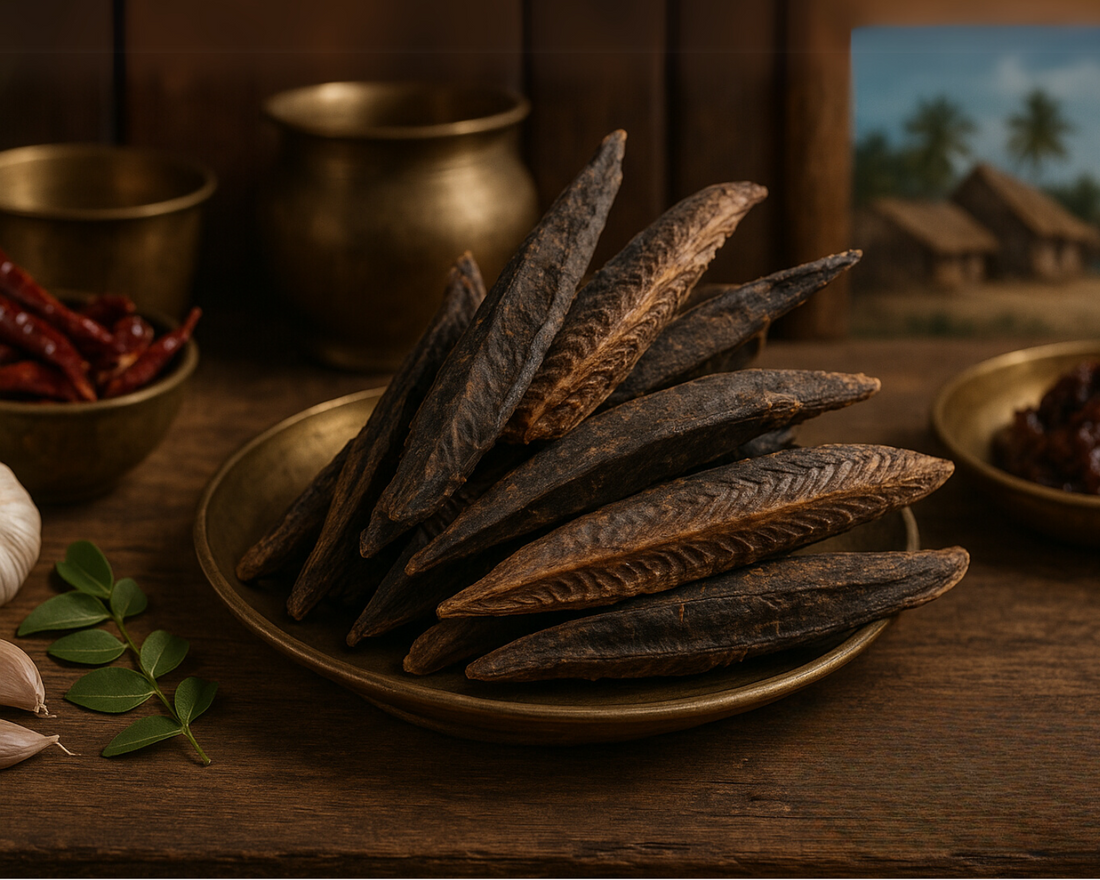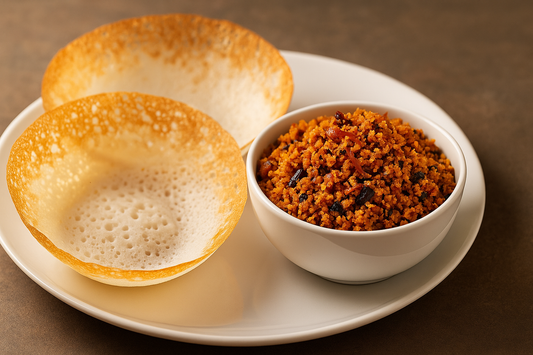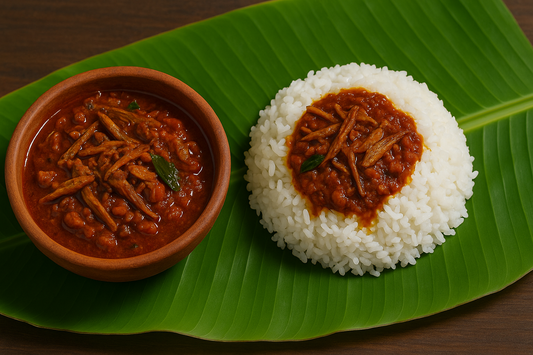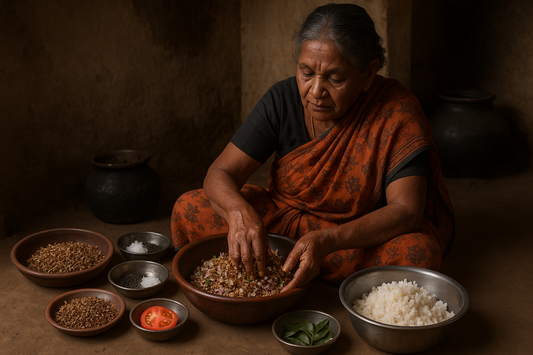
Maasi Karuvadu 101: What It Is and Why It Tastes So Good
Share
There's something magical about food that bridges generations. Along the coastal regions of South India and Sri Lanka, one culinary treasure has been quietly transforming meals for centuries: Maasi Karuvadu, also known as Maldive dry fish.
Maasi (மாசி) in Tamil Nadu, Umbalakada in Sri Lanka, and Mas Min in the Maldives, this sun-dried fish may go by many names, but its bold, briny essence stays the same. In Tamil homes, "maa-si" (pronounced maa-see) is more than just an ingredient; it’s a shortcut to depth, nostalgia, and unmistakable coastal flavor.
The Heart of South Indian Flavor: Maasi Karuvadu in Every Kitchen
In traditional Tamil kitchens, this intensely flavored dried fish elevates everyday cooking. A pinch of Maldive fish flakes in rasam creates depth nothing else can match. Mixed into coconut chutney, Maasi Karuvadu adds complexity that makes the simplest dosa memorable. Sprinkled into podi mixtures, it provides an umami foundation that transforms ordinary rice into a satisfying meal.
What makes Tamil dry fish so remarkable is its concentrated savory profile, developed through preservation methods refined across generations in coastal Tamil Nadu.
What is Maasi Karuvadu? The Story Behind Maldivian Dry Fish
Maasi Karuvadu is essentially dried tuna processed into small pieces or powder form. Traditionally made from skipjack tuna caught in waters surrounding South India and Sri Lanka, the craft begins with fresh fish that's cleaned, boiled, and dried under the intense tropical sun.
The expertise lies in timing, knowing precisely when to harvest the fish, how long to sun-dry it, and the exact smoking technique afterward. After drying, Maldive fish is typically smoked slightly, then pounded into smaller pieces or a coarse powder. The result is a concentrated ingredient that remains flavorful for months when stored properly.
Maldive Fish Flakes: A Culinary Heritage
Despite often being called "Maldive fish chips," these aren't chips in the conventional sense. The name references their historical trading connection to the Maldives, where similar preservation techniques developed centuries ago.
These small, dark pieces of dried fish represent one of the oldest forms of food preservation in coastal South Asia. What began as necessity evolved into culinary preference, with Maldivian dry fish becoming irreplaceable in traditional cooking throughout the region.
Unlike other karuvadu (dried fish) consumed as larger pieces, Maasi Karuvadu is distinctive in its flaked or powdered form – ideal for dishes where flavor, rather than texture, is essential. It’s no wonder many households turn it into Maasi Thokku, a fiery, oil-rich preserve that pairs brilliantly with idli, dosai, or just plain rice. It's one of those “last spoon left in the jar” kind of condiments that never lasts too long.
The Sri Lankan Connection: Elevating Maldive Fish
In Sri Lanka, Maasi Karuvadu (locally called Umbalakada) holds profound cultural significance. Sri Lankan cuisine has elevated its use to an art form, incorporating Maldive fish flakes into coconut sambol, mallum (green leaf dishes), and countless curry preparations.
Coastal communities source tuna from the Indian Ocean, with fishing villages specializing in creating this preserved delicacy. Even today, family operations preserve their distinctive techniques for drying and smoking Maldivian dry fish as precious heritage.
Sri Lankan preparations often involve additional spices during processing, creating regional variations with distinctive characteristics that maintain relevance even alongside modern preservation methods.
Beyond Tradition: Modern Maasi Karuvadu Recipes
Contemporary South Asian chefs continue finding new applications while honoring traditional Tamil dry fish recipes:
Karuvadu Thokku: A spicy condiment where Maasi Karuvadu is sautéed with tamarind, red chilies, and spices to create a versatile preserve that enhances any meal.
Varuval: A dry preparation where Maldive fish is rehydrated slightly and sautéed with onions, curry leaves, and spices until deliciously crisp.
Kuzhambu: A tangy tamarind-based South Indian curry enhanced with Maasi Karuvadu that pairs perfectly with steamed rice.
Amp it up with a spoon of Thoothukudi Fish Curry Masala (தூத்துக்குடி மீன் குழம்பு மசாலா) for that signature coastal depth — no grinding, just stir and simmer.
Coconut Sambol: A Sri Lankan staple mixing Maldive fish flakes with freshly grated coconut, lime juice, onions, and chilies – served with everything from string hoppers to rice.
Potato Curry: In certain regions, a small amount adds remarkable depth without overwhelming the dish with fishy flavor.
What's striking is how just a pinch transforms these dishes entirely, making Maldive fish the secret behind many beloved South Indian recipes.
Health Benefits: The Nutritional Value of Maasi Karuvadu
Beyond flavor, Maasi Karuvadu offers impressive nutritional benefits. This South Indian dry fish provides concentrated protein in just small amounts. The preservation process naturally concentrates calcium from the small bones that soften during drying, making it a significant source of this essential mineral.
Rich in omega-3 fatty acids, Maldive dry fish contributes to heart health when used regularly in cooking. Its high protein-to-volume ratio made it historically valuable in regions where protein sources were limited throughout certain seasons.
The traditional smoking process also acts as a natural preservative, eliminating the need for artificial additives, something increasingly valued in modern nutrition.
From Ocean to Table: A Timeless Tradition
The story of Maasi Karuvadu reflects remarkable culinary resilience. While many traditional ingredients have disappeared, this powerful flavor enhancer maintains its essential place in South Indian kitchens worldwide. It represents the ingenuity of Tamil Nadu's coastal communities, who transformed a preservation necessity into a culinary treasure.
For those who grew up with the distinctive aroma of Maldive fish wafting through kitchens, nothing else can replicate its contribution to authentic Tamil dishes. For those discovering it for the first time, it offers a window into centuries of South Indian culinary evolution.
Wondering where to find authentic Maasi Karuvadu to elevate your home cooking? Caruvadu brings it straight from the coast to your kitchen, clean, bold, and packed with tradition. Click here to explore.
Are you wondering where to elevate your home cooking? Click here to bring this treasured culinary heritage directly to your kitchen.




